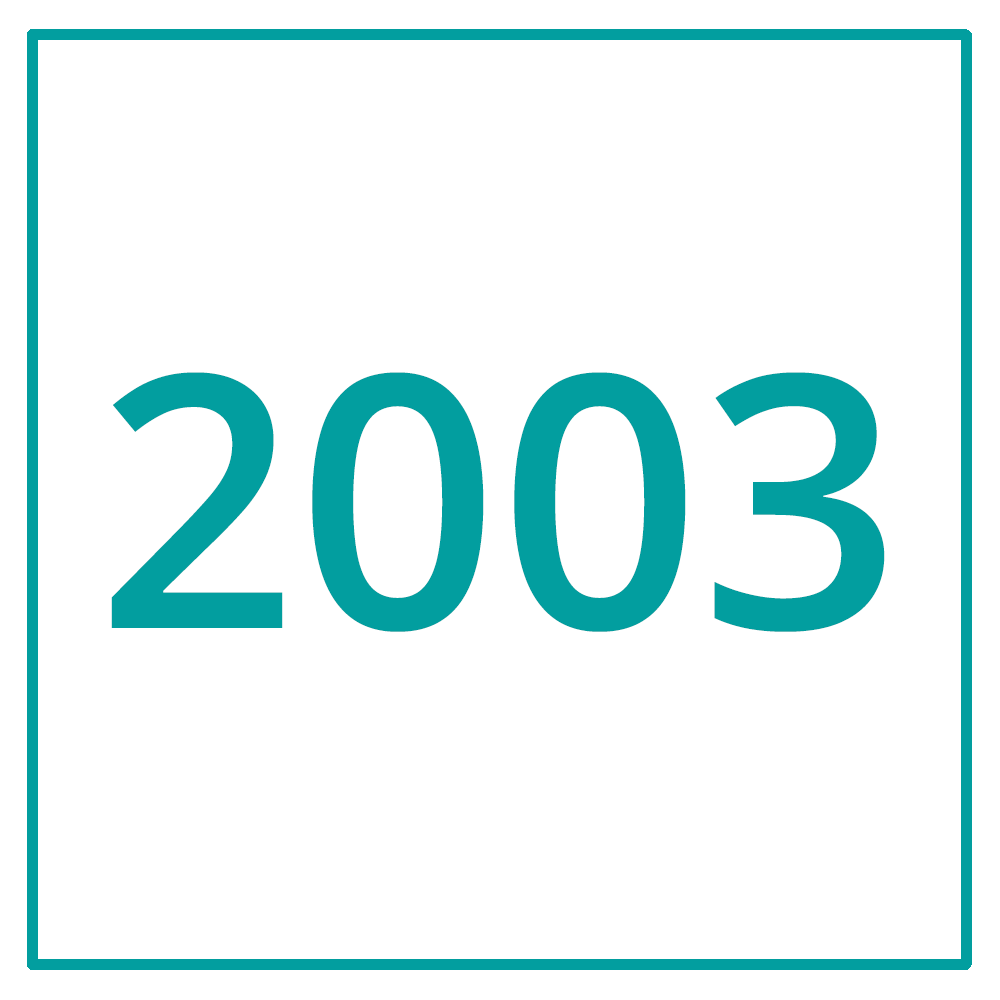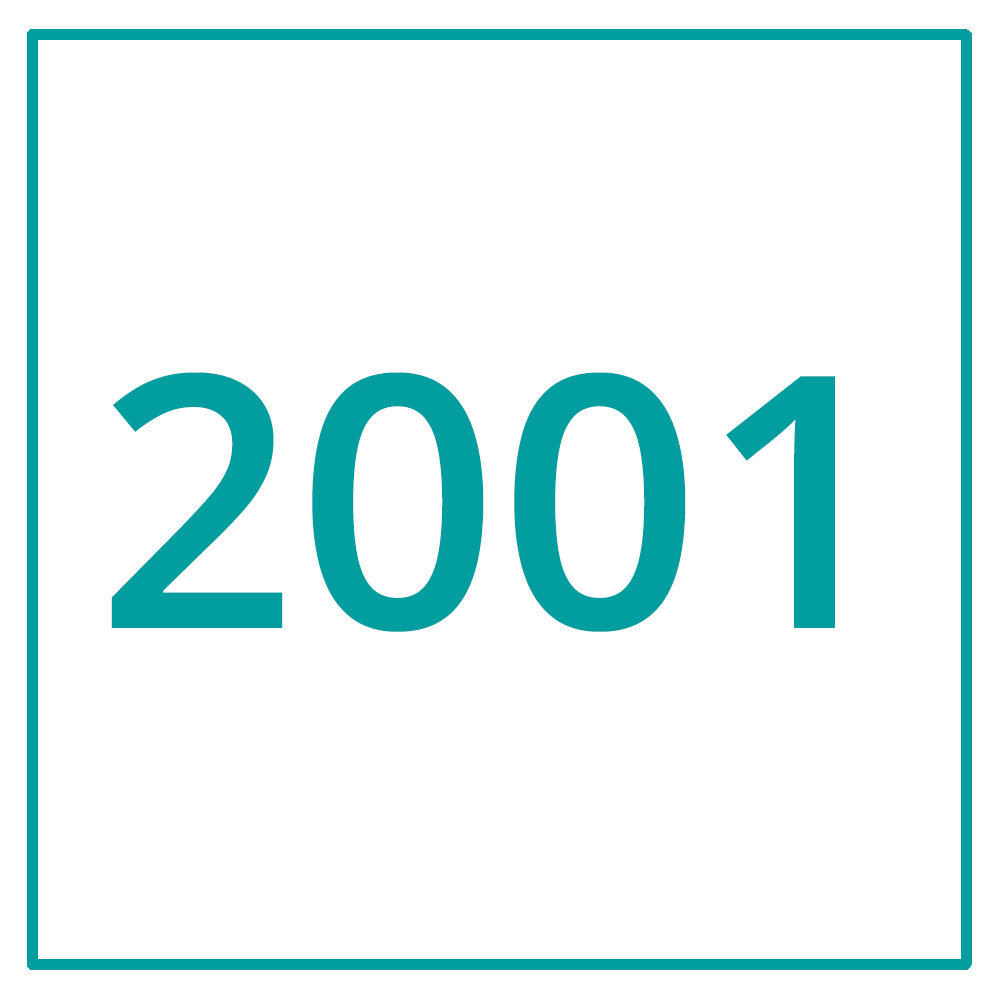Select your language
ICILS was initiated and is organized by the International Association for the Evaluation of Educational Achievement (IEA). ICILS measures competences relating to the use of a computer as a tool for work, communication, to search for and evaluate information. Since 2018, it has also assessed computational thinking skills, which involve solving problems using algorithmic thinking. The study has been conducted every five years since 2013. Poland participated in the first cycle of the study.
The study measures the competences of students in the eighth year of schooling, with the average age of participants not being less than 13.5 years. In Poland, the 2013 study was conducted among second-year lower secondary school (gimnazjum) students.
The study is conducted on a representative, random sample of students. The sampling is done in two stages – first, schools are randomly selected, then specific 8th-grade classes are randomly chosen within those schools. All students from the selected classes are invited to participate. Approximately 150 schools and 4,000–5,000 students usually participate in the study in each country. During the assessment, which takes place at school, students use a computer to complete task sets focusing on computer and information literacy, and after this, they respond to questionnaires.
The study also examines a range of contextual factors relating to the opinions and attitudes of students, their home and educational experiences, teacher experiences, teaching processes at the classroom and school level, and school resources and organization pertaining to the use of ICT. Data on these issues are collected through questionnaires completed by students, teachers of various subjects, school ICT coordinators, and the principals of the selected schools.
Teachers of eighth-grade classes also participate in ICILS. In each sampled school, teachers are randomly selected from all those teaching at this grade level, not only from those who teach the students selected for the assessment. This approach makes it possible to generalize the findings to the entire population of eighth-grade teachers in a given country.
The ICILS study in Poland is conducted by the Educational Research Institute – National Research Institute. Poland will participate in the study again in 2028. ICILS 2028 is being conducted on behalf of the Ministry of National Education. The study is conducted as part of the project "Preparation and implementation of international educational research in the field of key competences” financed by European Funds for Social Development (FERS).
The number of countries and regions participating in ICILS has varied. In the first 2013 cycle, 22 countries and regions took part, while a decade later, 35 countries and regions participated.
For more information, please visit the IEA website.
Data and instruments
The study assessment framework
The scope and assumptions of each ICILS cycle are presented in the assessment framework. The frameworks for successive cycles maintain a continuity that is essential for making comparisons across cycles. However, they are reviewed and updated for each cycle to reflect, among other things, technological advancements and the rapidly changing digital reality that the study addresses. The preparation of each framework involves experts as well as representatives of the participating countries
The assessment framework for each ICILS cycle is available on the IEA website.
Country Reports – Poland
So far, one country report from the ICILS study has been prepared. The Polish report provides a more detailed discussion of the results concerning Poland and students from Polish schools: these results are analyzed and described more thoroughly, and compared with results from other countries.
ICILS 2013
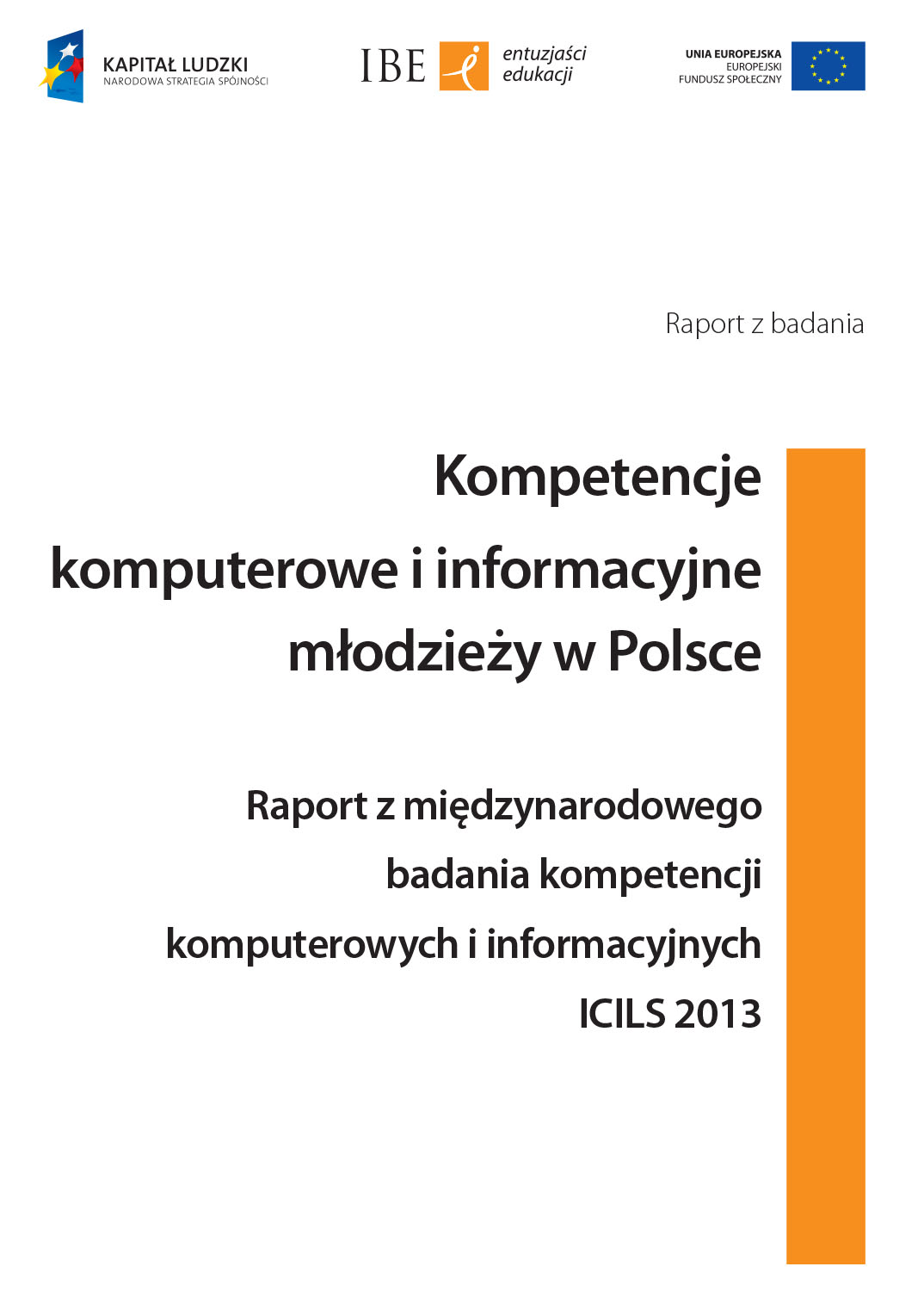
Polish ICILS 2013 Report
Sijko K. (red.) (2014). Kompetencje komputerowe i informacyjne młodzieży w Polsce. Raport z międzynarodowego badania kompetencji komputerowych i informacyjnych ICILS 2013
Warszawa: Instytut Badań Edukacyjnych
International Reports
International reports presenting the results of individual ICILS cycles, as well as other publications and materials related to the study are available on the IEA websites.
ICILS 2023
The study was held from 2021 to 2024. The main study at schools was conducted in 2023 and its results were announced in November 2024. The databases were released in February 2025.
Poland did not participate in the 2023 cycle of the ICILS study.
TIMSS was initiated by the International Association for the Evaluation of Educational Achievement (IEA). The TIMSS & PIRLS International Study Center at the Lynch School of Education and Human Development of Boston College is responsible for conducting the study. TIMSS measures the knowledge and skills of students in mathematics and science. The study has been conducted every four years since 1995. Poland has participated in it since 2011.
The study measures the skills of students in the fourth and/or eighth year of their formal schooling, with the average age of students at the time of the assessment not being less than 9.5 and 13.5 years, respectively. Until 2023, the study in Poland was conducted exclusively with the younger group of students. In 2011, third-grade primary school students took part in the study. Since 2015, it has been conducted among fourth-grade students. For the first time, TIMSS 2027 will include both fourth-grade and eighth-grade primary school students in Poland.
The study is conducted on a representative, random sample of students. Based on the results, conclusions can be drawn about the entire population of all fourth-grade and/or eighth-grade students attending schools in a given country. The sampling is done in two stages – first, schools are randomly selected, then specific 4th and/or 8th-grade classes are randomly chosen within those schools. All students from the selected classes are invited to participate in the study. During the assessment, which takes place at school, students complete sets of mathematics and science tasks, followed by questionnaires. Approximately 150 schools and 4,000–5,000 students usually participate in the study for each age group within every country.
In addition to knowledge and skills, the study examines a range of contextual factors relating to, among others, students’ opinions and attitudes, their home environment and educational experiences, teachers’ opinions and experiences, teaching processes at the classroom and school level, and the school’s resources and organization. Data on these issues are collected through questionnaires completed by students, school principals, mathematics and science teachers from the assessed classes, and the parents of the fourth-grade students.
In Poland, the format of the TIMSS study was paper-based until 2019. 2023 was the first cycle in which students completed tasks on computers, with school principals and teachers completing their questionnaires online. The parents’ questionnaires remained paper-based. TIMSS 2027 will be the first cycle in which the computer-based version will be mandatory for the student assessment in all participating countries.
The first cycle of the study in Poland (2011) was conducted by a team from the Central Examination Board. Subsequent cycles have been the responsibility of the Educational Research Institute, implementing the study on behalf of the Ministry of National Education. The TIMSS 2027 study is being conducted as part of the project "Preparation and implementation of international educational research in the field of key competences" financed by European Funds for Social Development (FERS).
The number of countries and regions participating in successive TIMSS cycles has varied. The first 1995 cycle had 34 countries and regions participating in the fourth-grade assessment, while 53 countries and regions participated in the eighth-grade assessment. TIMSS 2023 had, respectively, 65 and 47 countries and regions taking part.
For more information, please visit: the Polish study website, the IEA website, and the TIMSS & PIRLS International Study Center website.
The study assessment framework
The scope and assumptions of each TIMSS cycle are presented in the assessment framework. The frameworks for successive cycles maintain a continuity that is essential for making comparisons across cycles. However, they are reviewed and updated for each cycle to reflect, among other things, research findings and significant changes in mathematics and science education. The preparation of each framework involves experts from various fields as well as representatives of the participating countries
The assessment framework for each TIMSS cycle is available on the IEA website and the TIMSS & PIRLS International Study Center website.
Country Reports – Poland
Country reports are prepared by the national research teams. The Polish reports provide a more detailed discussion of the results concerning Poland and students from Polish schools. These results are analyzed and described more thoroughly, compared with results from other countries and previous cycles, and also take into account changes in the Polish education system.
TIMSS 2023
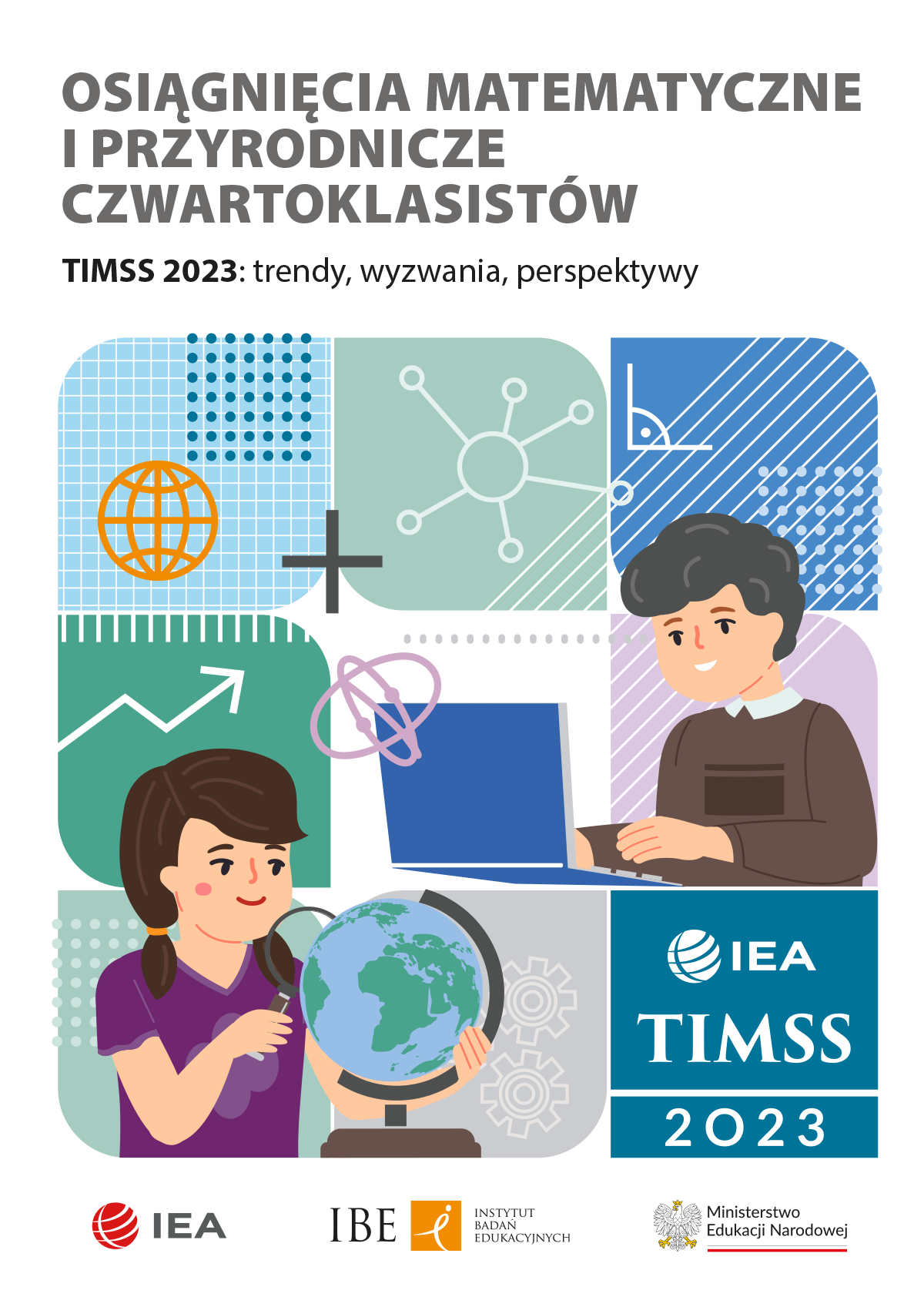
Polish TIMSS 2023 Report
Dobosz-Leszczyńska, W. (red.). (2024). Osiągnięcia matematyczne i przyrodnicze czwartoklasistów. TIMSS 2023: trendy, wyzwania, perspektywy.
Warszawa: Instytut Badań Edukacyjnych
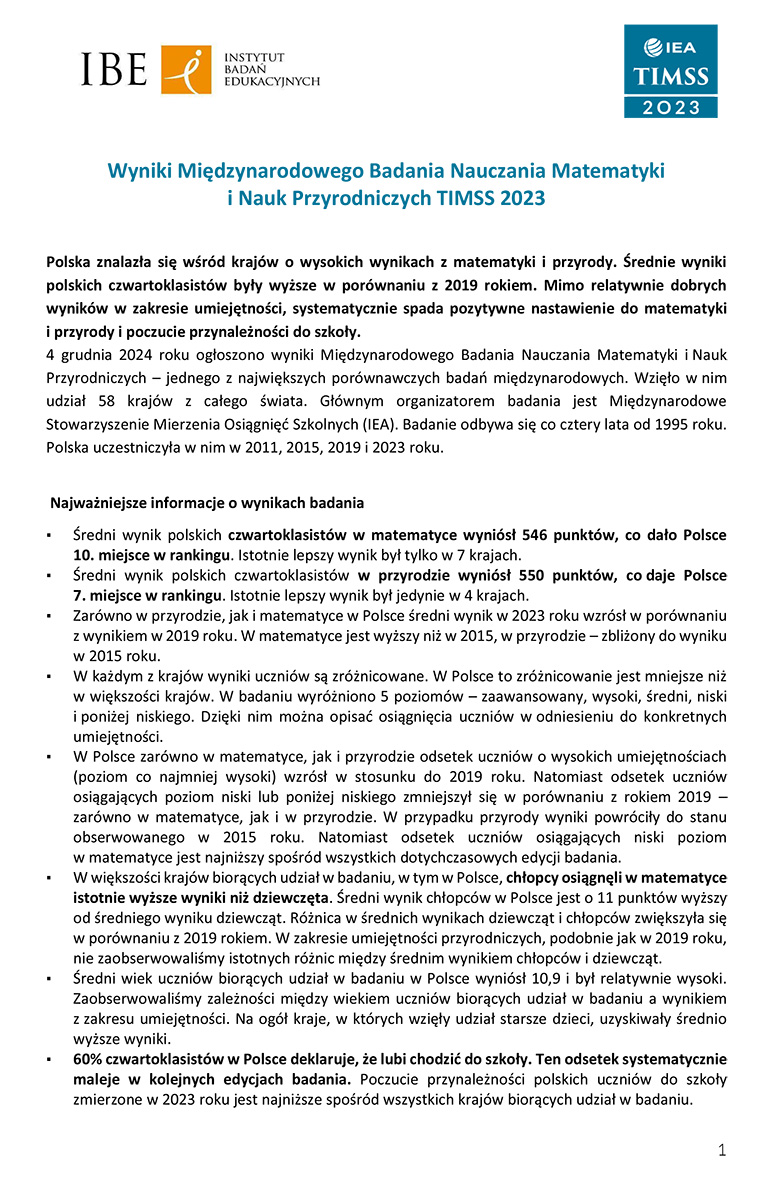
TIMSS 2019
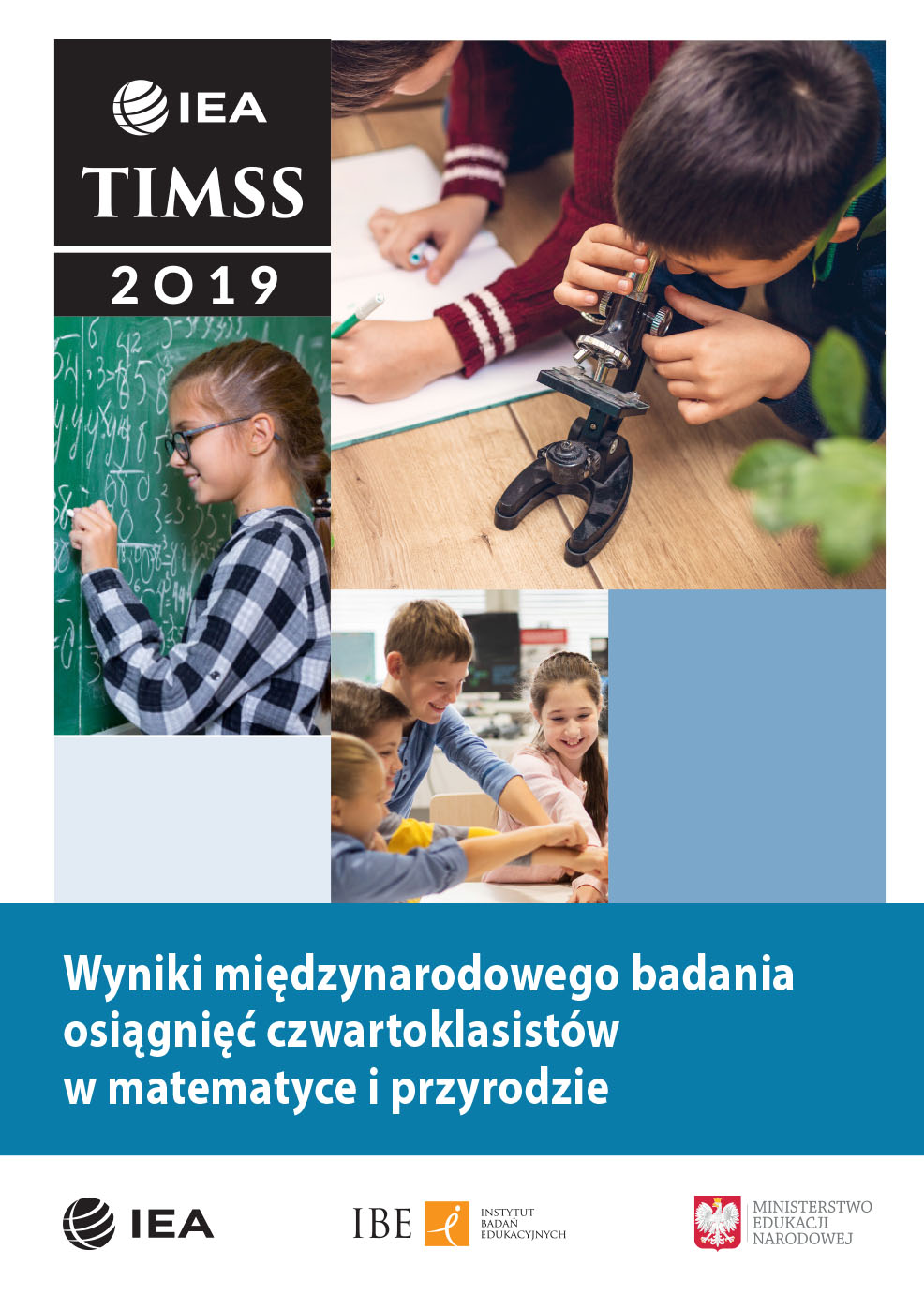
Polish TIMSS 2019 Report
Sitek M. (red.) (2020). TIMSS 2019. Wyniki międzynarodowego badania osiągnięć czwartoklasistów w matematyce i przyrodzie.
Warszawa: Instytut Badań Edukacyjnych
TIMSS 2015
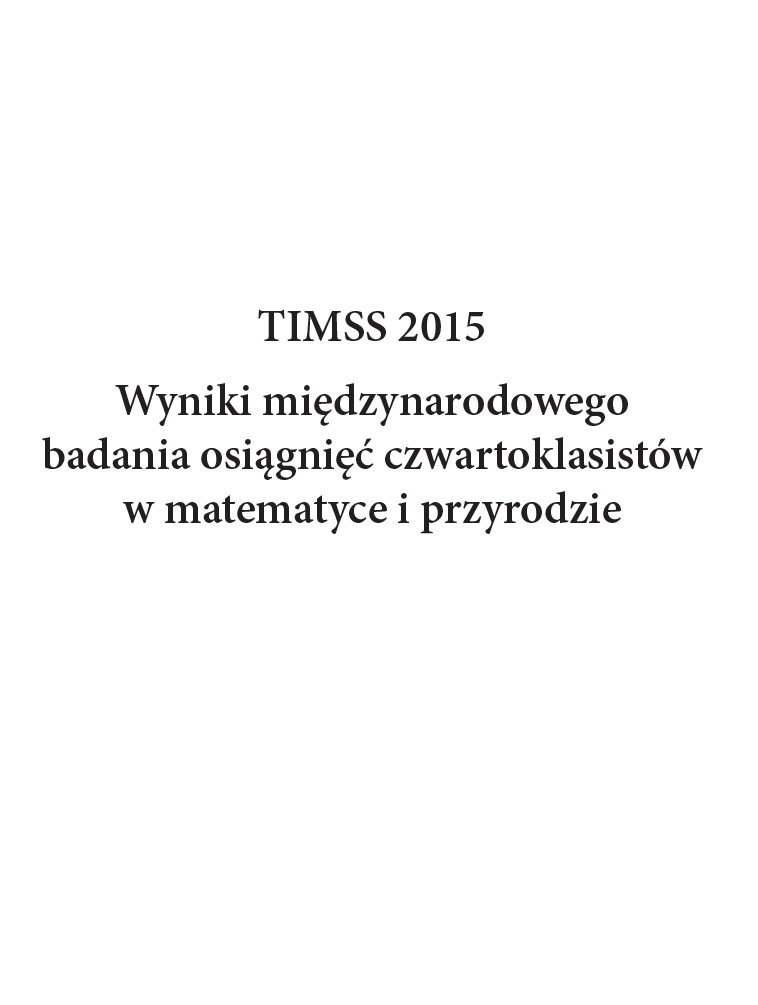
Polish TIMSS 2015 Report
Konarzewski K., Bulkowski K. (red.) (2016). TIMSS 2015. Wyniki międzynarodowego badania osiągnięć czwartoklasistów w matematyce i przyrodzie.
Warszawa: Instytut Badań Edukacyjnych
TIMSS 2011
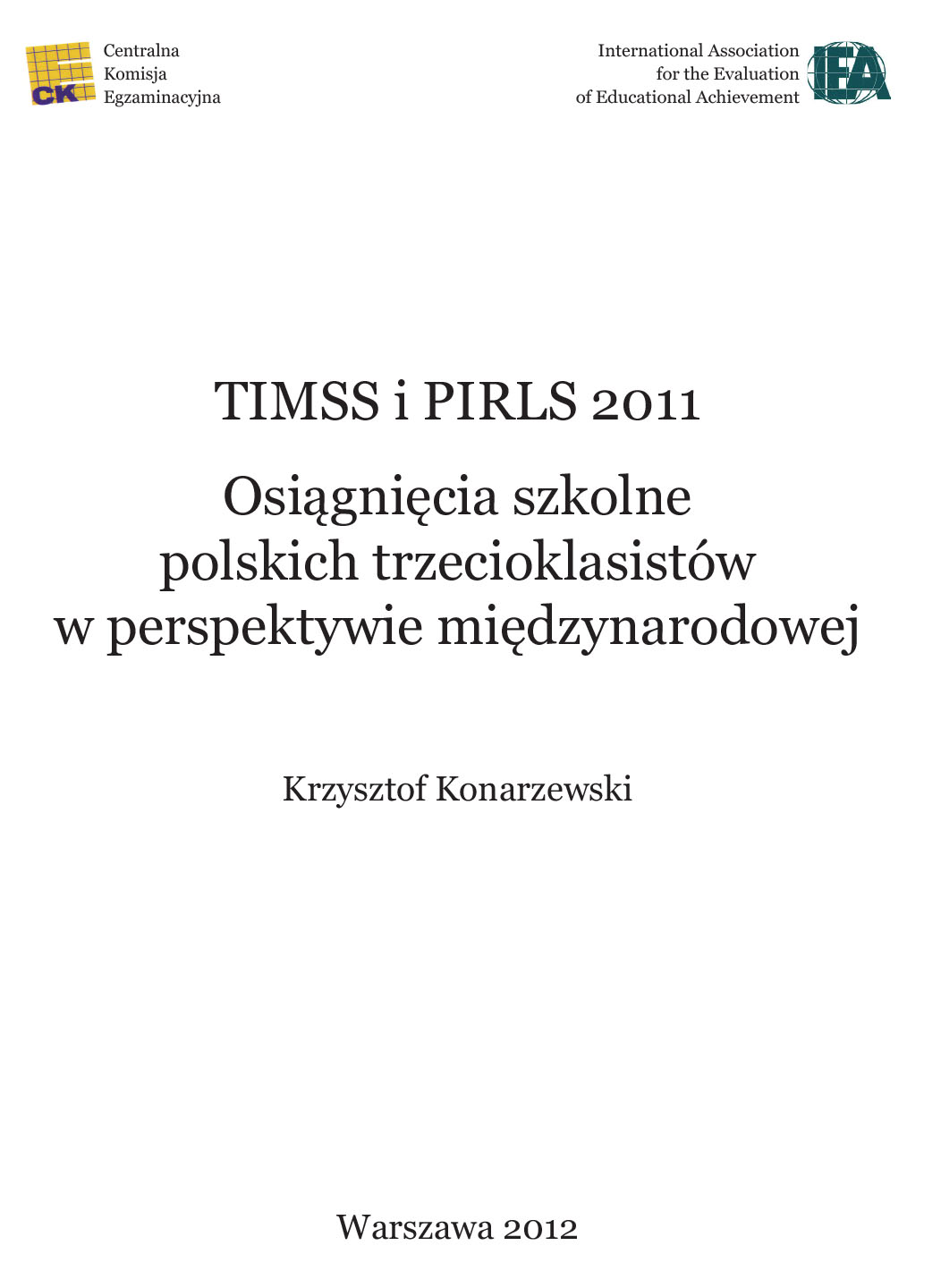
Polish TIMSS 2011 Report
Konarzewski, K (red.) (2012). TIMSS i PIRLS 2011. Osiągnięcia szkolnej polskich trzecioklasistów w perspektywie międzynarodowej.
Warszawa: Centralna Komisja Egzaminacyjna
International Reports
International reports presenting the results of individual TIMSS cycles, as well as other publications and materials related to the study are available on the IEA and the TIMSS & PIRLS International Study Center websites.
TIMSS 1995
TIMSS 2023
The study was held from 2021 to 2024. The main study at schools was conducted in 2023 and its results were announced on December 4, 2024. The databases were released in February 2025.
The detailed schedule of TIMSS 2023 is available here.
PIRLS was initiated by the International Association for the Evaluation of Educational Achievement (IEA). The TIMSS & PIRLS International Study Center at the Lynch School of Education and Human Development of Boston College is responsible for conducting the study. PIRLS measures the literacy skills of students. The study has been conducted every five years since 2001. Poland has participated in it since 2006.
The study measures the skills of students in their fourth year of formal schooling, with the average age of students at the time of the assessment being not less than 9.5 years. In Poland, third-grade students were assessed in 2006 and 2011; since 2016, fourth-grade students have been assessed.
The study is conducted on a representative, random sample of students. The sampling is done in two stages – first, schools are randomly selected, and then specific classes are randomly chosen within those schools. All students from the selected classes are invited to participate in the study. During the assessment, which takes place at school, students complete task sets containing informational and literary texts, and then complete questionnaires. Approximately 150 schools and 4,000–5,000 students usually participate in the study in each country.
In addition to knowledge and skills, the study examines a range of contextual factors relating to, among others, students’ opinions and attitudes, their home environment and educational experiences, teachers’ opinions and experiences, teaching processes at the classroom and school level, and the school’s resources and organization. Data on these issues are collected through questionnaires completed by students, their parents, school principals, native language teachers (from the assessed classes).
The PIRLS study in Poland has so far been conducted in paper format. PIRLS 2026 will be the first cycle in which Poland will participate using the computer-based version of the assessment.
A team from the Central Examination Board conducted the first two cycles of the PIRLS study in Poland (2006 and 2011). The Educational Research Institute is responsible for subsequent study cycles, undertaken on behalf of the Ministry of National Education. PIRLS 2026 is being conducted as part of the project "Preparation and implementation of international educational research in the field of key competences" financed by European Funds for Social Development (FERS).
The number of countries and regions participating in successive cycles of PIRLS has varied. In the first cycle of 2001, 37 countries and regions took part, while in the most recent one, PIRLS 2021, 65 countries and regions participated.
For more information, please visit: the Polish study website, the IEA website, and the TIMSS & PIRLS International Study Center website.
Data and instruments
The study assessment framework
The scope and assumptions of each PIRLS cycle are presented in the assessment framework. The frameworks for successive cycles maintain a continuity that is essential for making comparisons across cycles. However, they are reviewed and updated for each cycle to reflect, among other things, research findings and significant changes in literacy education. The preparation of each framework involves experts as well as representatives of the participating countries.
The assessment framework for each PIRLS cycle is available on the IEA website and the TIMSS & PIRLS International Study Center website.
Country Reports – Poland
Country reports are prepared by the national research teams. The Polish reports provide a more detailed discussion of the results concerning Poland and students from Polish schools. These results are analyzed and described more thoroughly, compared with results from other countries and previous cycles, and also take into account changes in the Polish education system.
PIRLS 2021
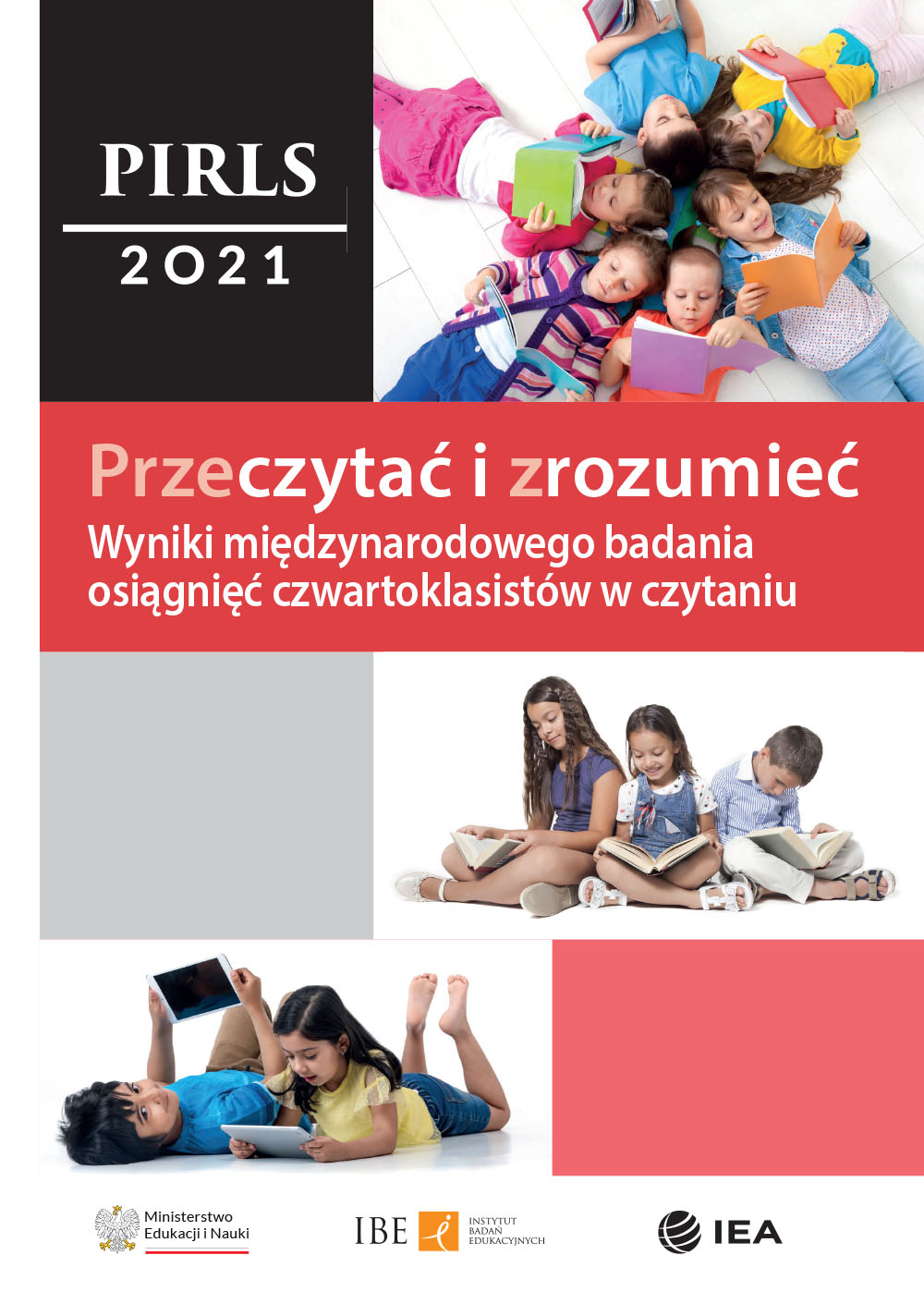
Polish PIRLS 2021 Report
Kaźmierczak J., Bulkowski K. (red.) (2023). Przeczytać i zrozumieć. Wyniki międzynarodowego badania osiągnięć czwartoklasistów w czytaniu – PIRLS 2021
Warszawa: Instytut Badań Edukacyjnych
View the printable version of the publication
View the digitally accessible version (WCAG) of the publication
PIRLS 2016
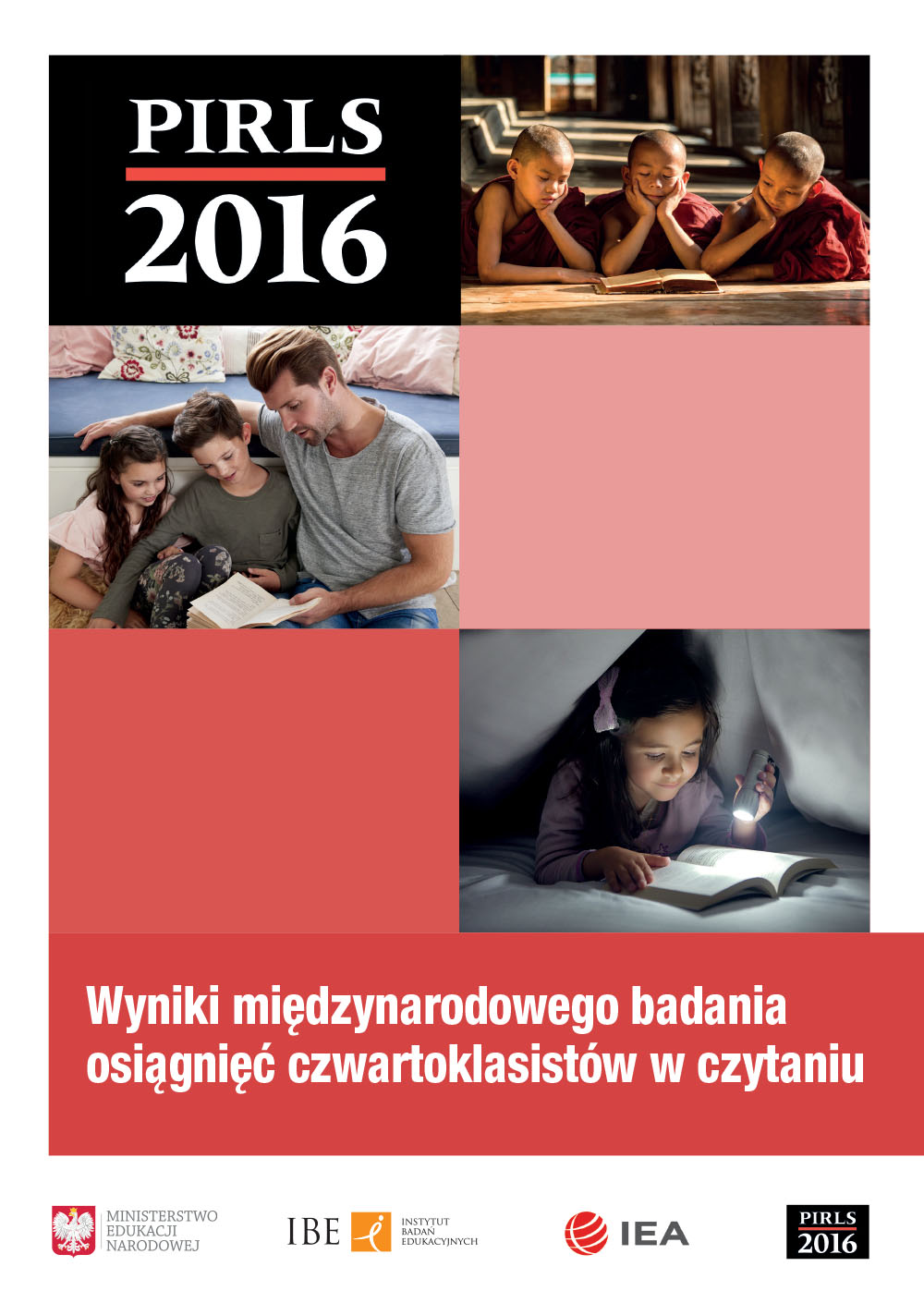
Polish PIRLS 2016 Report
Konarzewski K., Bulkowski K. (2017). PIRLS 2016. Wyniki międzynarodowego badania osiągnięć czwartoklasistów w czytaniu
Warszawa: Instytut Badań Edukacyjnych
PIRLS 2011

Polish PIRLS 2011 Report
Konarzewski K. (2012). TIMSS i PIRLS 2011. Osiągnięcia szkolne polskich trzecioklasistów w perspektywie międzynarodowej
Warszawa: Centralna Komisja Egzaminacyjna
International Reports
International reports presenting the results of each study cycle, as well as other publications and materials related to the study are available on the websites of IEA and the TIMSS & PIRLS International Study Center.
PIRLS 2026
The study is being conducted in 2024–2027. The pilot study was held in 2025, and the main study at schools will be conducted in 2026. The release of the PIRLS 2026 results is scheduled for December 2027.
The detailed schedule for the PIRLS 2026 study is available here.
PISA was initiated and is organized by the Organisation for Economic Co-operation and Development (OECD). It is coordinated by the PISA team at the OECD Secretariat. The priorities of the study are set by the PISA Governing Board, which includes one representative from the Ministry of Education of each participating country.
Until now, PISA has been conducted every three years (with the exception of 2022, when it was postponed by one year due to the COVID-19 pandemic). Starting from 2025, it will be conducted every four years. Poland has participated in every cycle of PISA since its very beginning in 2000.
PISA measures the skills of fifteen-year-olds that are essential for effective functioning in adult life in the following areas:
- reading,
- mathematics,
- science.
In each cycle of the study, one of these three domains is designated as the major focus and is more extensively developed. This allows for more precise and detailed analyses of that particular area. The major domains in each cycle of the study were as follows: reading – in 2000, 2009, and 2018; mathematics – in 2003, 2012, and 2022; science – in 2006, 2015, and 2025.
Each cycle of the study can also include additional domains and components, both national and international. Poland participated in the financial literacy assessment in 2012, 2015, 2018, and 2022; in the problem-solving assessment in 2006 and 2012; and in the creative thinking assessment in 2022. Polish students are taking part in the “learning in the digital world” assessment in PISA 2025.
The study also covers a range of contextual issues, relating, among other things, to students’ opinions and attitudes, their home environment and educational experiences, as well as school resources and organization. Data on these issues are collected through questionnaires completed by students and school principals from the sampled schools, and – depending on the cycle and country – also by teachers of the assessed domains and students’ parents.
Participants in the PISA study are students who turned 15 in the year preceding the assessment. During the period in Poland when the education system included six-year primary schools and lower secondary schools (gimnazjum), nearly all 15-year-old PISA participants attended the third year of lower secondary school. Under the current system of eight-year primary schools, the participants are mainly students in the first and second years of upper secondary school.
The study is conducted on a representative, random sample of students. Based on the results, conclusions can be drawn about the entire population of 15-year-olds attending school in a given country. The sampling is done in two stages – first, schools are randomly selected, and then individual students are randomly chosen from those schools. In Poland, approximately 200–250 schools are usually involved in the study.
During the assessment, students complete task sets in specific study domains, followed by questionnaires. In the 2000–2012 cycles, the study was conducted in paper format. Since 2006, elements of computer-based assessment have been gradually introduced. They were first implemented in Poland in 2009. Since 2015, the PISA study has been conducted primarily as a computer-based assessment, and since 2018, adaptive testing has been introduced in the major assessment domains. This allows the difficulty level of questions to be adjusted to the estimated skill level of the students tested.
The first cycles of the study in Poland were conducted by the Institute of Philosophy and Sociology of the Polish Academy of Sciences (IFiS PAN). Since 2015, the Educational Research Institute has been responsible for implementing the study on behalf of the Ministry of National Education. In the first PISA cycle in 2000, 43 countries and regions participated, including Poland. Since then, the number of participating countries has increased significantly. More than 90 countries and regions are taking part in PISA 2025.
More information is available on the Polish PISA study website and on the OECD website.
The study assessment framework
The scope and assumptions of each PISA cycle are presented in the assessment framework. The core principles of the study have remained unchanged since the first assessment. However, the range of skills measured is reviewed in each cycle, taking into account changes occurring in the modern world. Therefore, the framework is updated before the start of each new cycle. The preparation of each framework involves experts from relevant fields as well as representatives of the participating countries.
The assessment framework for each PISA cycle is available on the OECD website.
Country reports – Poland
Country reports are prepared by national research teams. Polish reports provide a more detailed discussion of the results concerning Poland and students from Polish schools. These results are analyzed and described more thoroughly, compared with results from other countries and previous cycles, and also take into account changes in the Polish education system.
PISA 2022
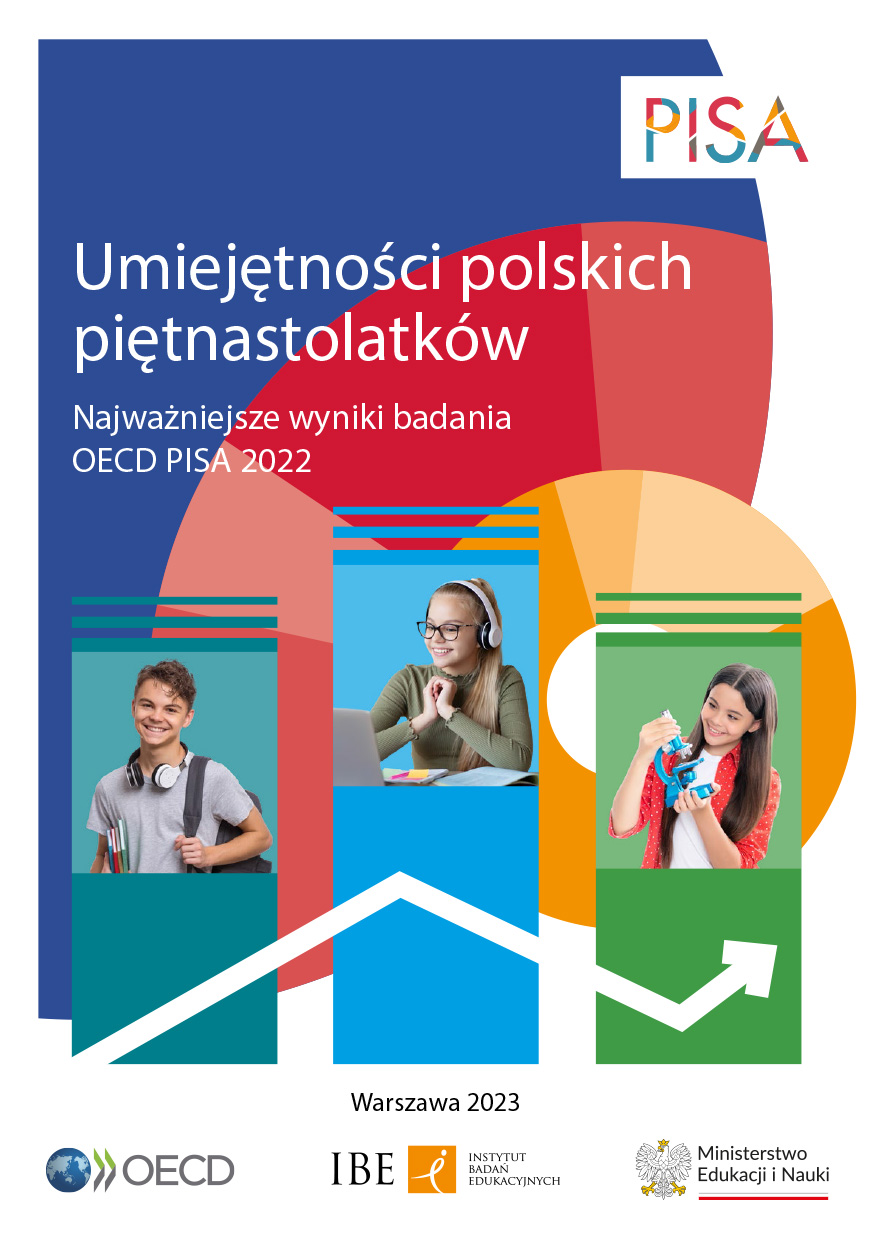
Polish PISA 2022 Report – Main Results
Bulkowski, K., Dobosz-Leszczyńska, W., Kaźmierczak, J. (2024). Umiejętności polskich piętnastolatków. Najważniejsze wyniki badania OECD PISA 2022
Warszawa: Instytut Badań Edukacyjnych
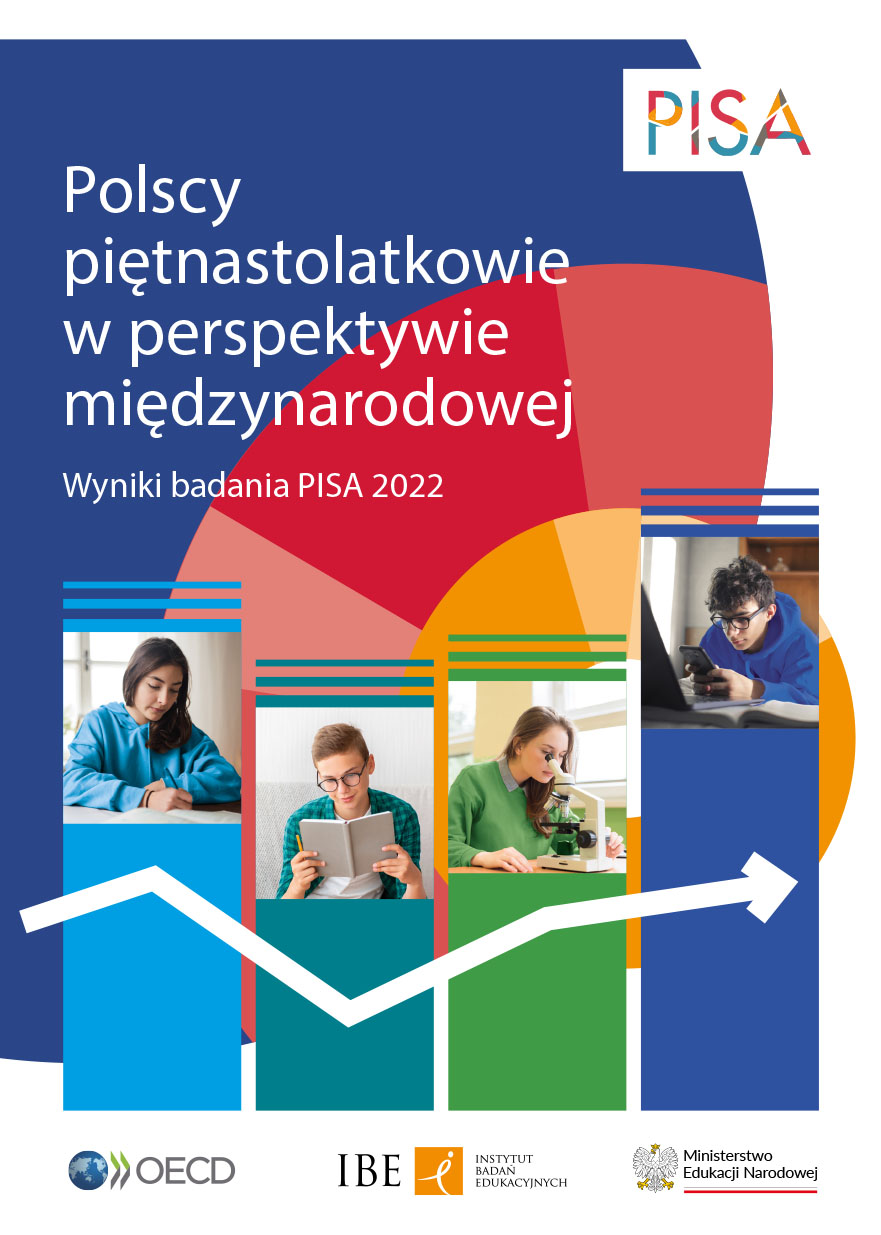
Polish PISA Report 2022
Kaźmierczak, J., Bulkowski, K. (red.) (2024). Polscy piętnastolatkowie w perspektywie międzynarodowej. Wyniki badania PISA 2022
Warszawa: Instytut Badań Edukacyjnych
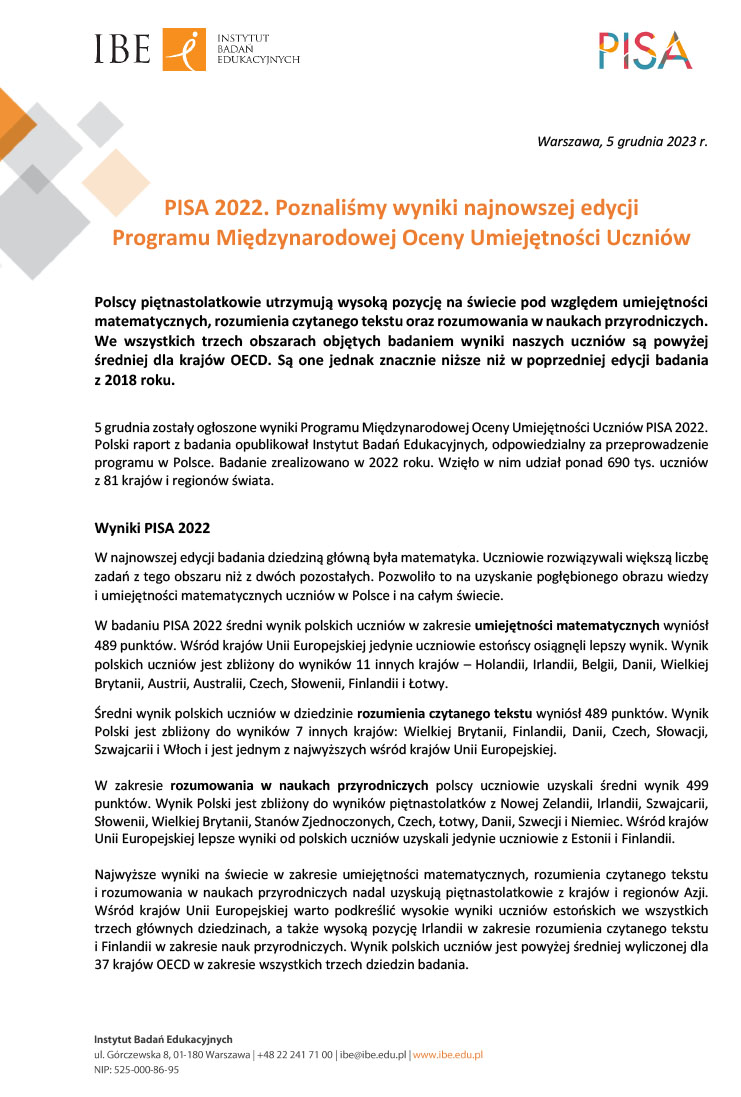
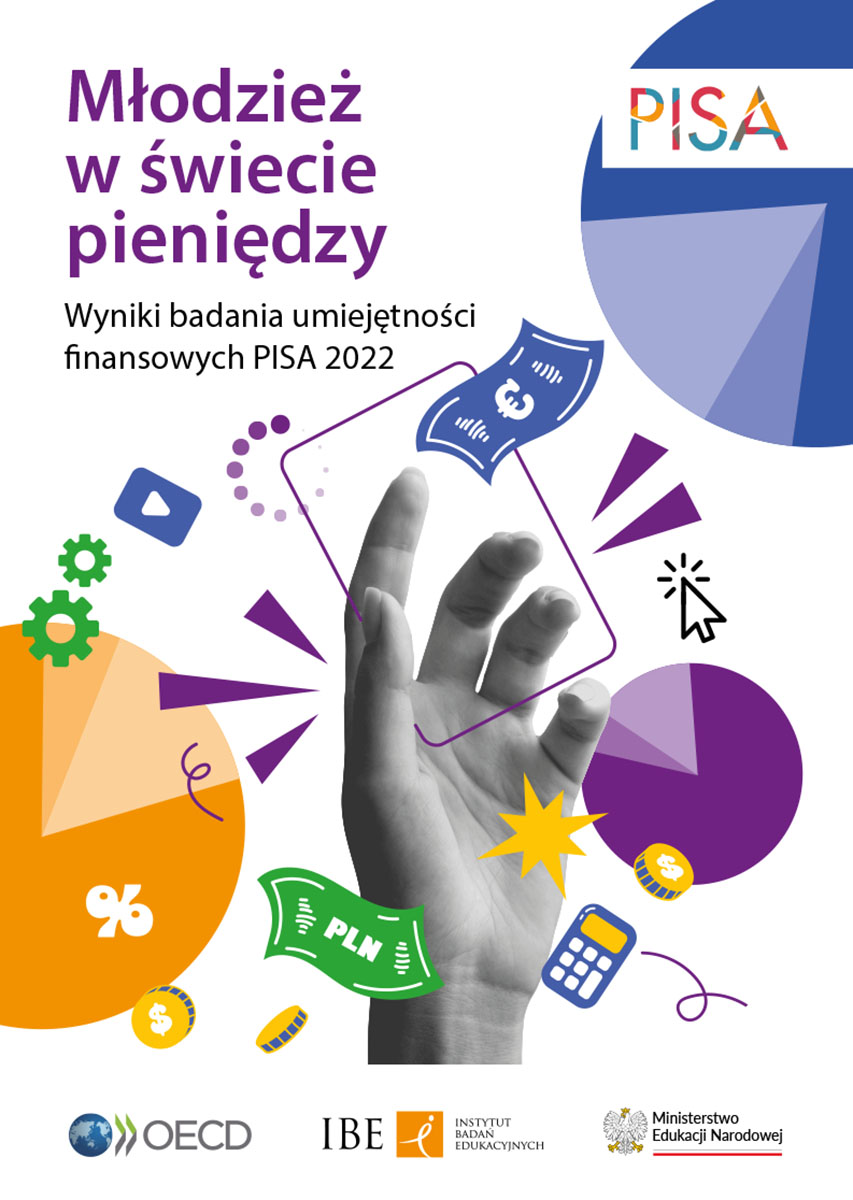
Polish PISA Report [2022, 2018]. Financial Literacy
Sitek, M., Wasilewska, O. (2024): Młodzież w świecie pieniędzy. Wyniki badania umiejętności finansowych PISA 2022
Warszawa: Instytut Badań Edukacyjnych
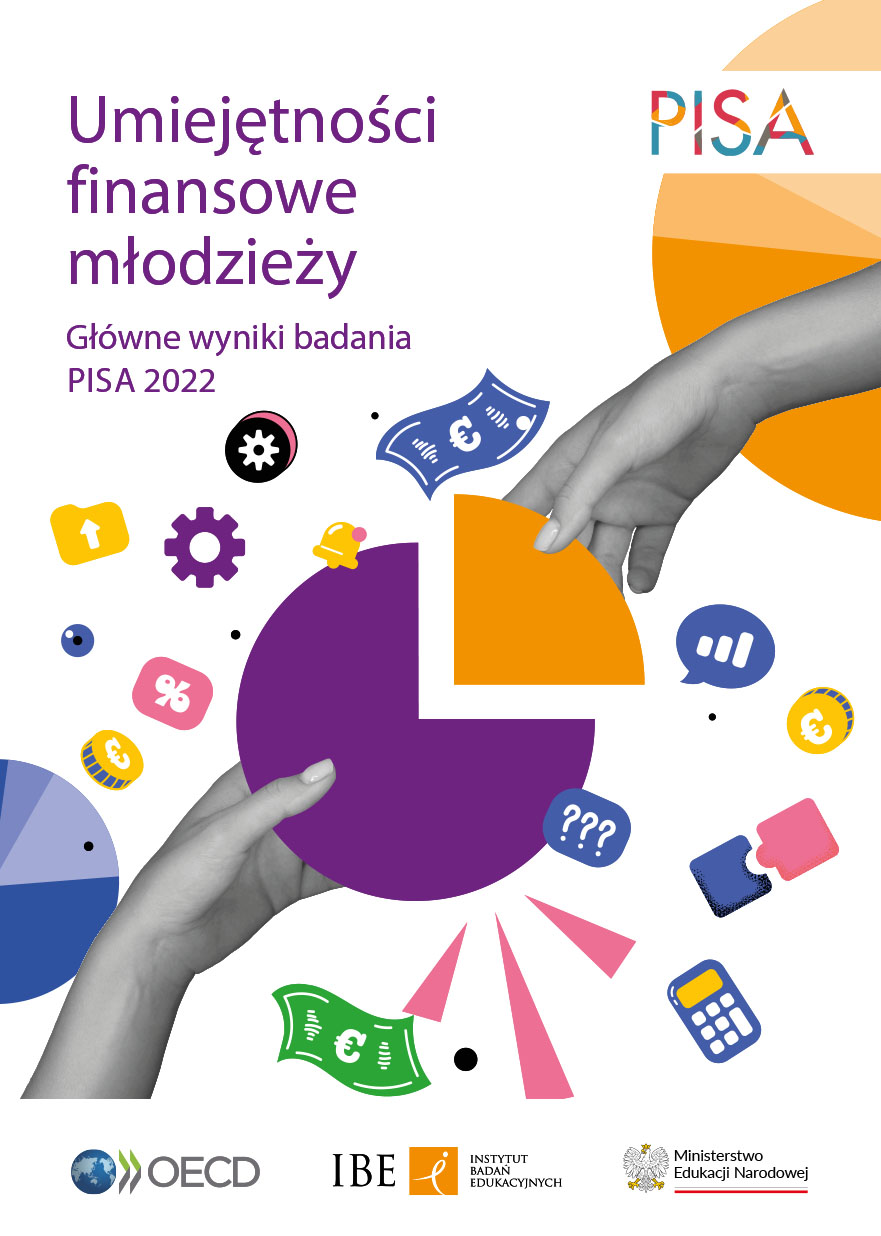
Polish PISA 2022 Report. Financial Literacy – Main Results
Sitek, M., Wasilewska, O. (2024). Umiejętności finansowe młodzieży. Główne wyniki badania PISA 2022
Warszawa: Instytut Badań Edukacyjnych
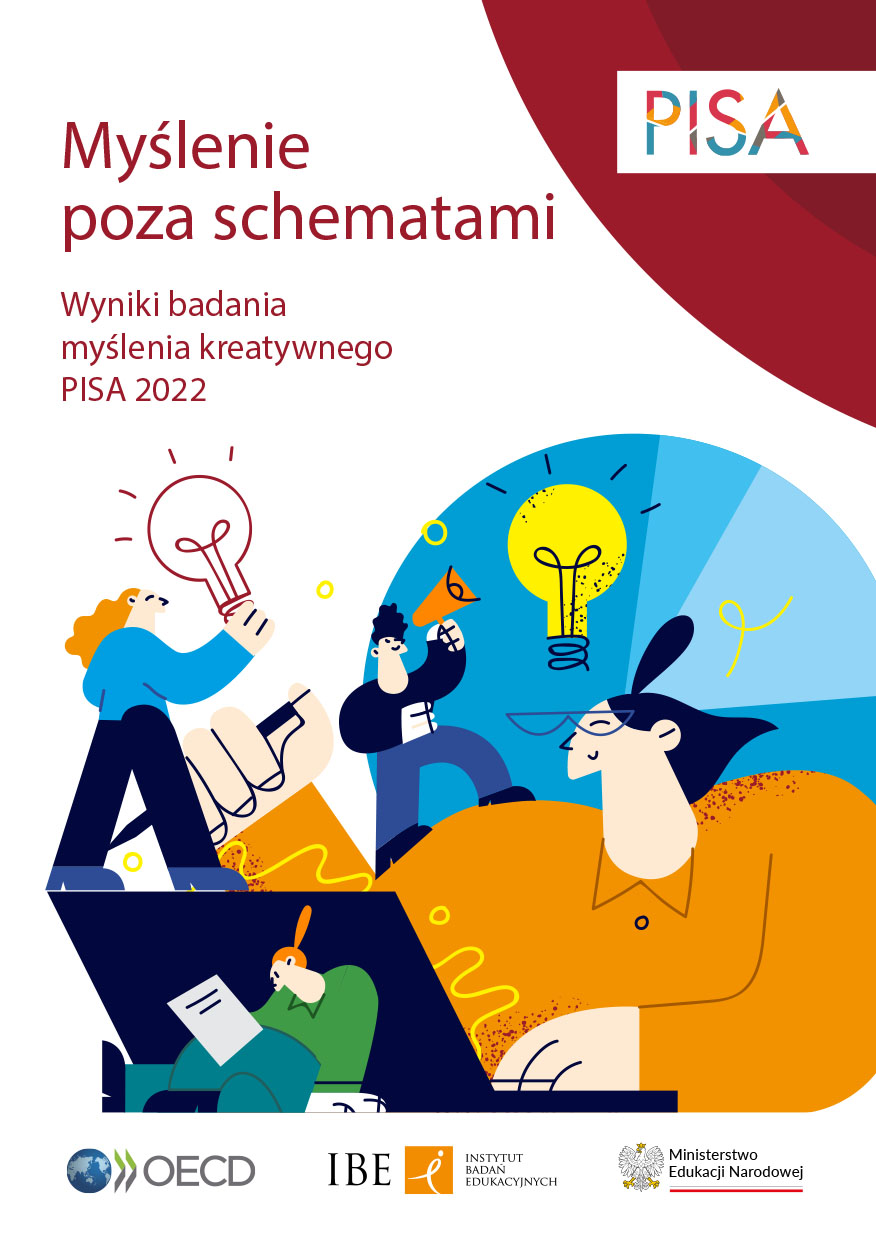
Polish PISA 2022 Report. Creative Thinking
Dobosz-Leszczyńska, W., Kaźmierczak, J., Weremiuk, A., (2024). Myślenie poza schematami. Wyniki badania myślenia kreatywnego PISA 2022.
Warszawa: Instytut Badań Edukacyjnych
PISA 2018
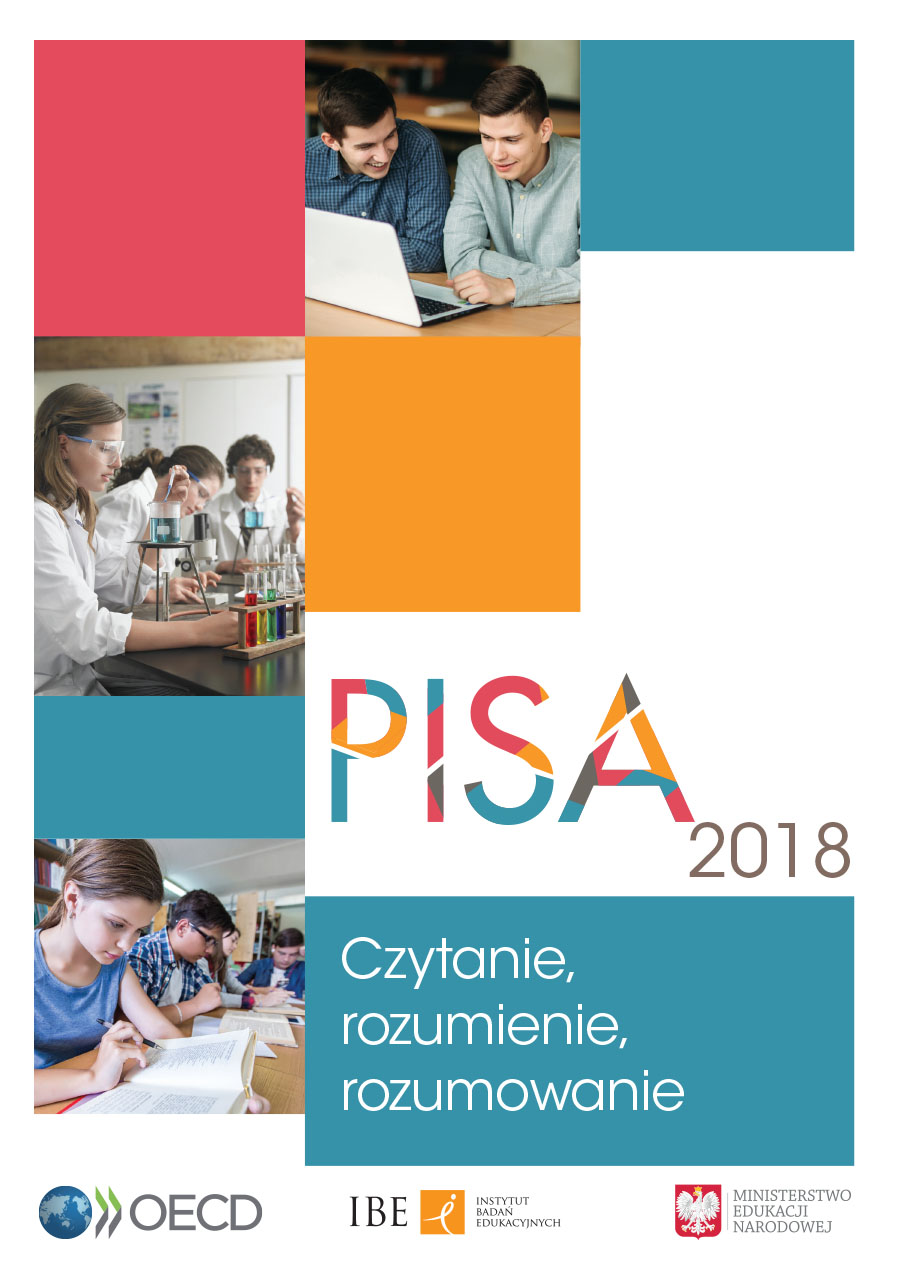
Polish PISA Report 2018
Ostrowska, B. (2020): Wyniki badania Czytanie, rozumienie, rozumowanie. PISA 2018
Warszawa: Instytut Badań Edukacyjnych
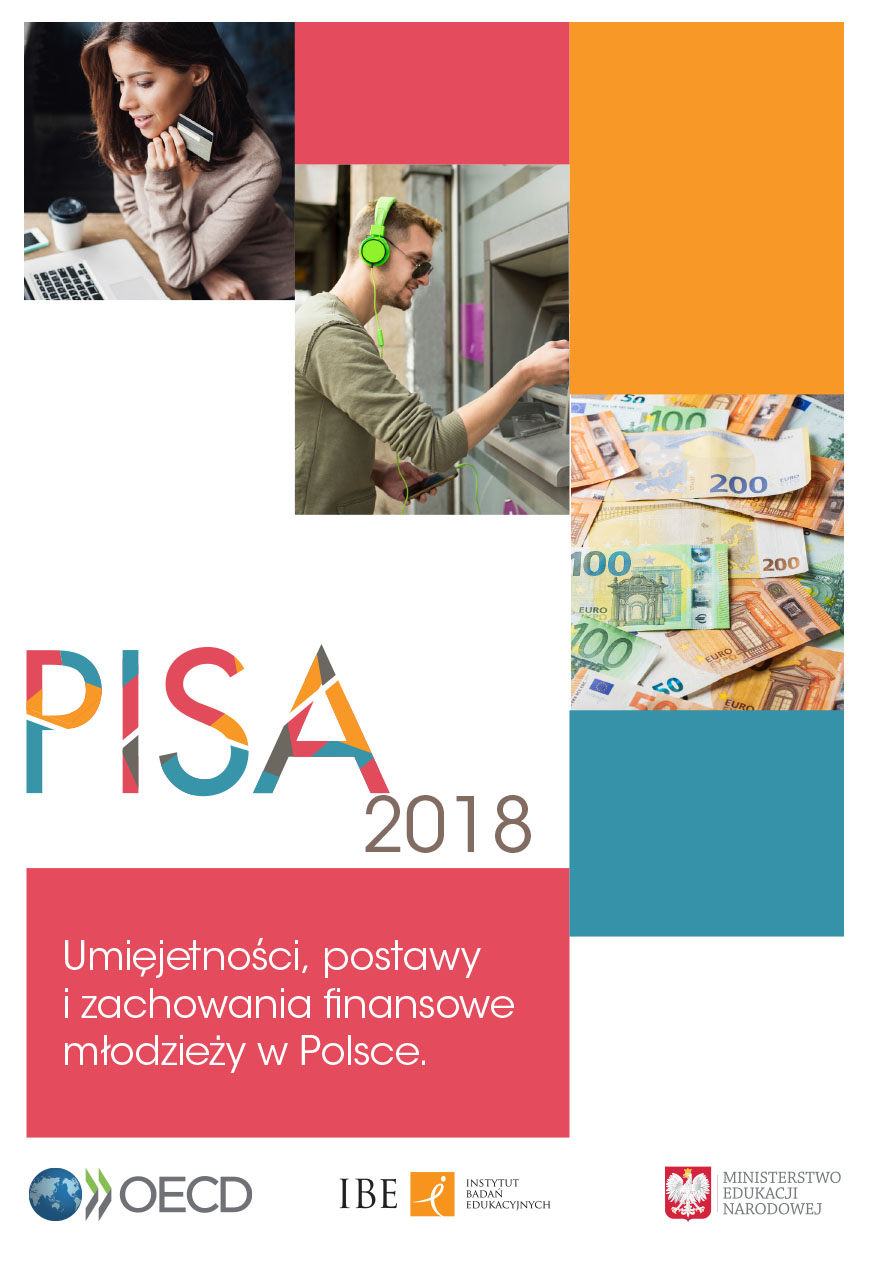
Polish PISA Report 2018. Financial Literacy
Sitek, M., Ostrowska B., Badiak M. (2020). Umiejętności, postawy i zachowania finansowe młodzieży w Polsce. Wyniki badania PISA 2018
Warszawa: Instytut Badań Edukacyjnych
PISA 2015
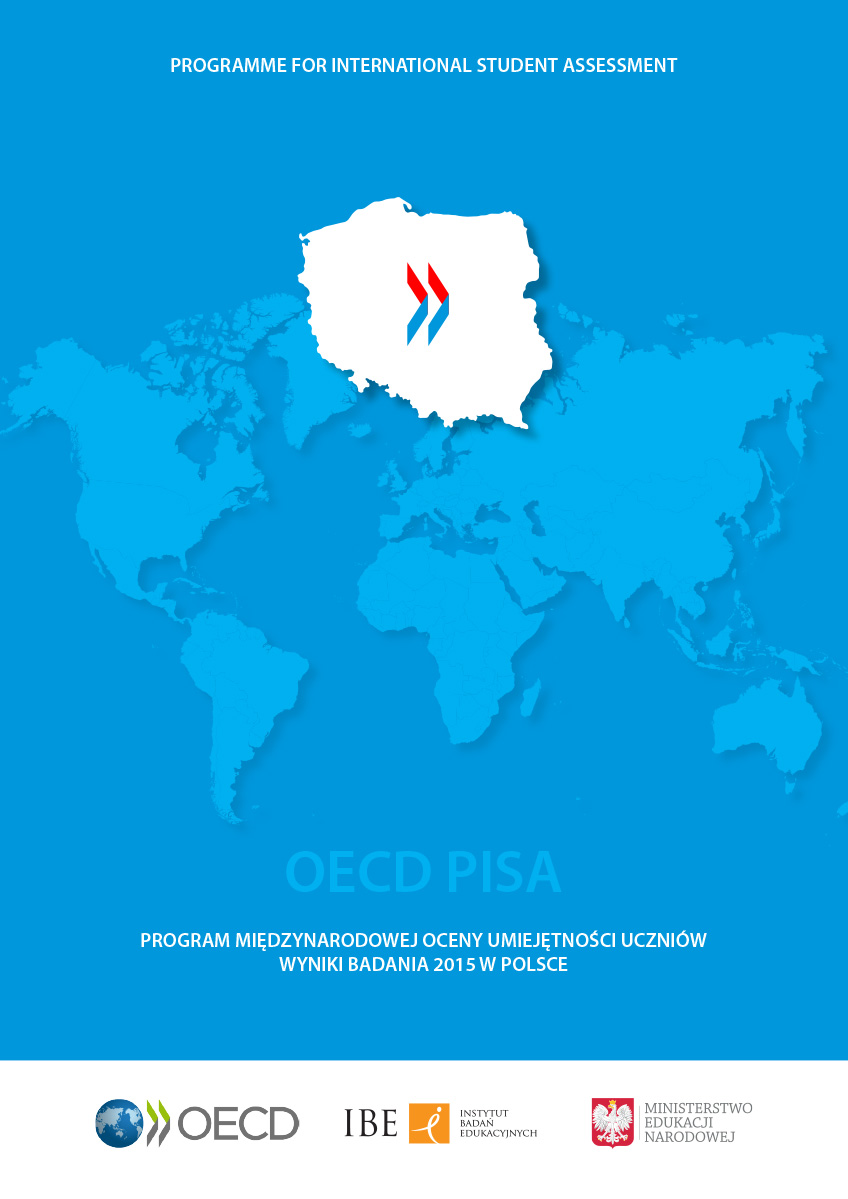
Polish PISA Report 2015
Sitek, M. (red.) (2016). OECD PISA. Program międzynarodowej oceny umiejętności uczniów. Wyniki badania 2015 w Polsce
Warszawa: Instytut Badań Edukacyjnych
PISA 2012
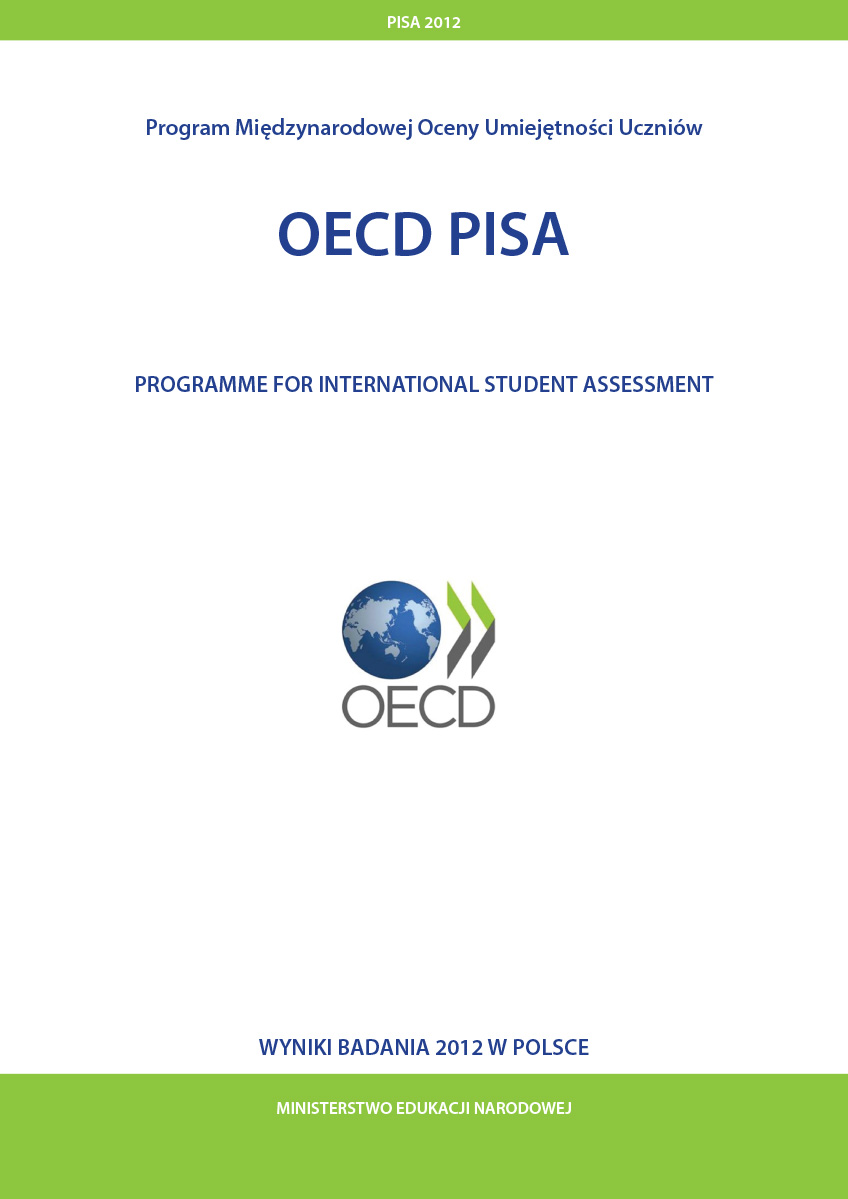
Polish PISA Report 2012
Fedorowicz, M. (red.) (2016). Program Międzynarodowej Oceny Umiejętności Uczniów OECD PISA. Wyniki badania 2012 w Polsce
Warszawa: Ministerstwo Edukacji Narodowej
PISA 2009
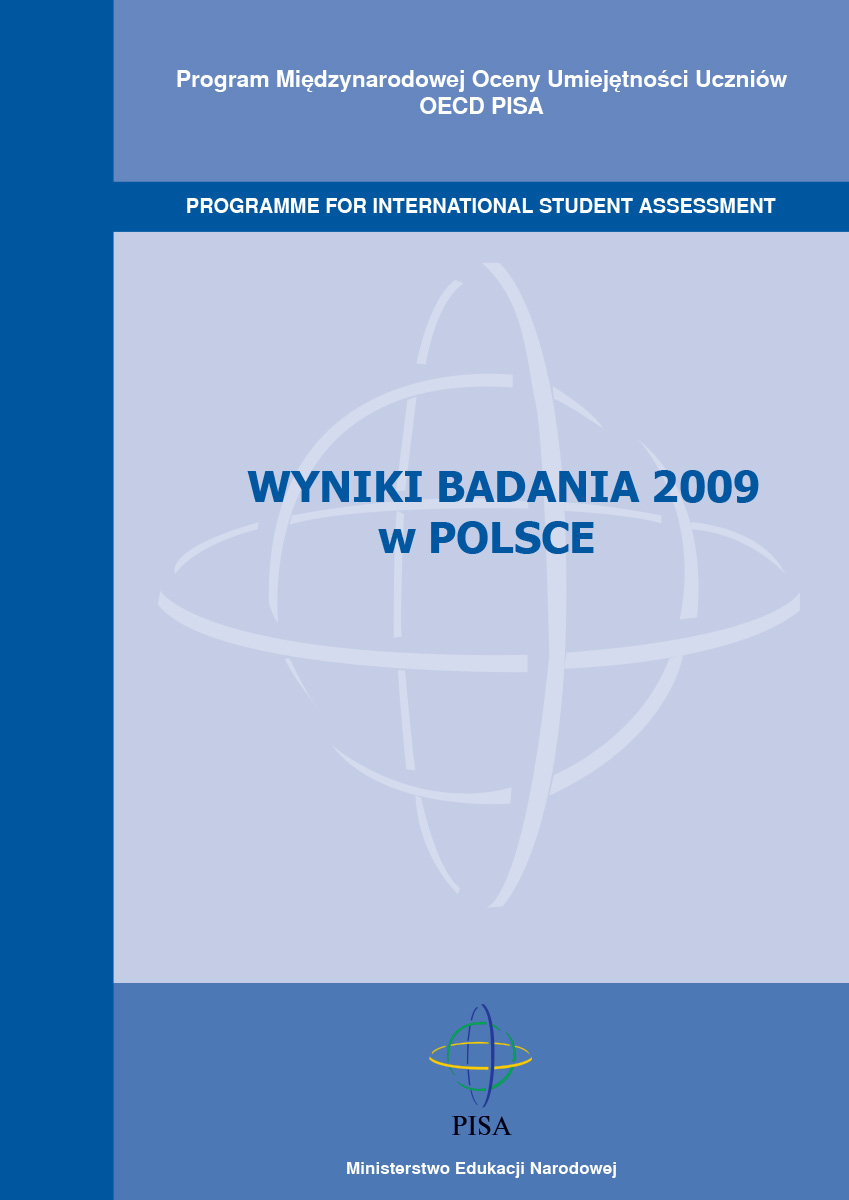
Polish PISA Report 2009
(2010). Program Międzynarodowej Oceny Umiejętności Uczniów OECD PISA. Wyniki badania 2009 w Polsce
Warszawa: Ministerstwo Edukacji Narodowej
PISA 2006
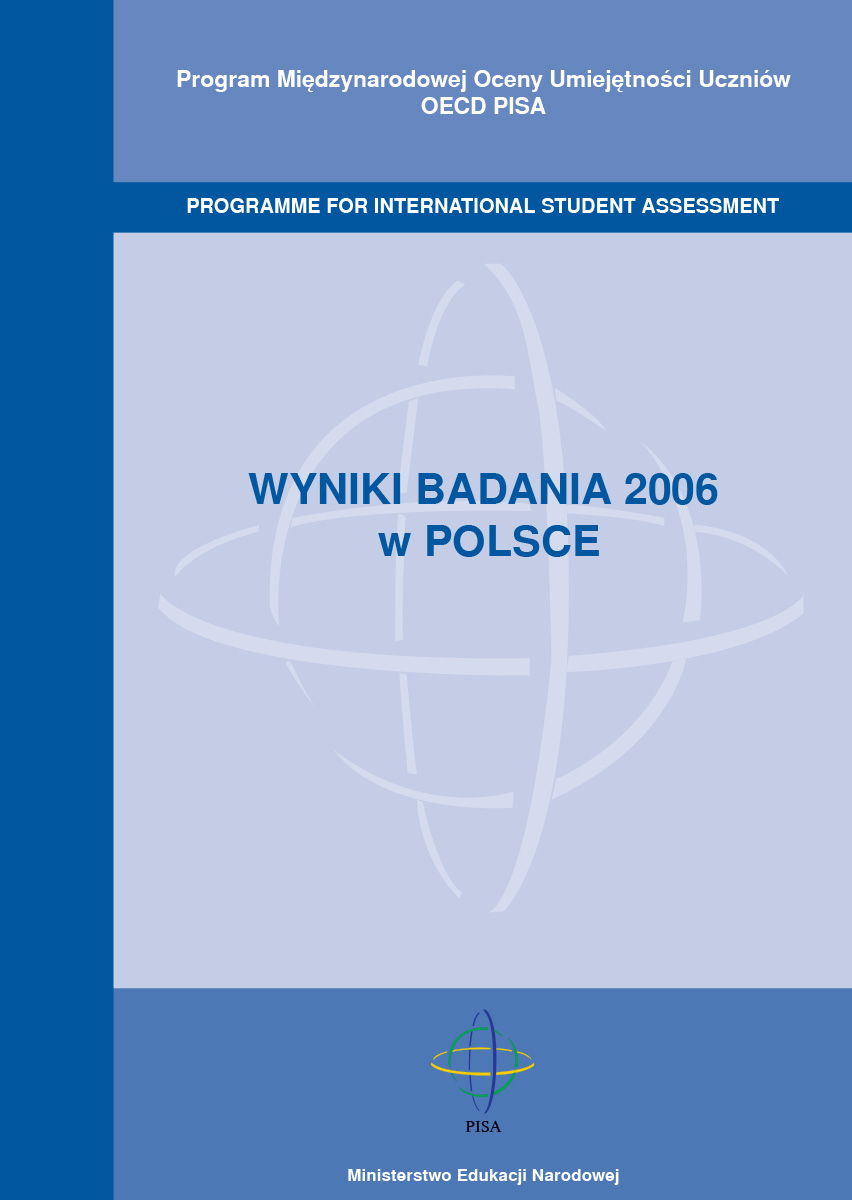
Polish PISA Report 2006
(2007). Program Międzynarodowej Oceny Umiejętności Uczniów OECD PISA. Wyniki badania 2006 w Polsce
Warszawa: Ministerstwo Edukacji Narodowej
International Reports
International reports presenting the results of individual cycles of the study as well as other publications and materials relating to the study are available on the OECD website.
PISA 2022
PISA 2022 Results (Volume I). The State of Learning and Equity in Education
PISA 2022 Results (Volume II). Learning During – and From – Disruption
PISA 2022 Results (Volume III). Creative Minds, Creative Schools
PISA 2022 Results (Volume IV). How Financially Smart Are Students?
PISA 2022 Results (Volume V). Learning Strategies and Attitudes for Life
PISA 2018
PISA 2018 Results (Volume I). What Students Know and Can Do
PISA 2018 Results (Volume II). Where All Students Can Succeed
PISA 2018 Results (Volume III). What School Life Means for Students’ Lives
PISA 2018 Results (Volume IV). Are Students Smart about Money?
PISA 2018 Results (Volume V). Effective Policies, Successful Schools
PISA 2018 Results (Volume VI). Are Students Ready to Thrive in an Interconnected World?
PISA 2012
PISA 2012 Results: What Students Know and Can Do (Volume I)
PISA 2012 Results: Excellence through Equity (Volume II). Giving Every Student the Chance to Succeed
PISA 2012 Results: Ready to Learn (Volume III). Students' Engagement, Drive and Self-Beliefs
PISA 2012 Results: What Makes Schools Successful (Volume IV). Resources, Policies and Practices
PISA 2012 Results: Students and Money (Volume VI). Financial Literacy Skills for the 21st Century
PISA 2025
The study is conducted in the years 2022–2027. The main study at schools was conducted in 2025. The results will be announced in 2026.
The detailed schedule of PISA 2025 is available here.
AIM OF THE PROJECT
Our aim is to provide reliable data, analysis and recommendations relevant to the development of the key competences of children and youth.
The collected data, analyses, findings, and recommendations will constitute an important knowledge resource for educational policy-making. They will support decision-making by institutions and bodies responsible for shaping education at the national, regional, and local levels. They will also be available to institutions responsible for initial teacher education and in-service training, as well as to schools and teachers themselves. The project will also include activities to promote the use of International Large-Scale Assessment data by different groups, including experts and academics.

PROJECT ACTIVITIES
What do we do?
Conducting successive cycles of four International Large-Scale Assessments (ILSA) in Poland
We will conduct successive cycles of four International Large-Scale Assessments (ILSA) in Poland in full compliance with all of the standards and requirements:
PIRLS 2026 – Progress in International Reading Literacy Study – measuring reading literacy, conducted in the fourth grade of primary school.
TIMSS 2027 – Trends in International Mathematics and Science Study – measuring mathematics and science skills, conducted in the fourth and eighth grade of primary school.
ICILS 2028 – International Computer and Information Literacy Study – measuring computer and information literacy, administered in the eighth grade of primary school.
SSES 2026 – Survey on Social and Emotional Skills – measuring the level of social and emotional skills among 15-year-old students, and in some countries additionally among 10-year-olds.
The datasets from the studies will be included in international, publicly available databases. National reports with the most important results will be published for the PIRLS, TIMSS and SSES studies. The timeline of each study is closely aligned with its international schedule.

Data analysis, development of conclusions and recommendations
We will conduct data analyses of various International Large-Scale Assessments, both those conducted within the project and those performed as part of other activities. We will prepare policy briefs, analyses and reports focusing on issues relevant to the education system in Poland. Areas of analysis, conclusions and recommendations will be consulted with key stakeholders. Additionally, we will conduct small-scale research to deepen our knowledge on selected issues, as well as analyses using secondary data.

Disseminating data, results, conclusions, and recommendations from the studies
As part of the project, we will carry out activities aimed at increasing the use of data, knowledge and experience from International Large-Scale Assessments by a wide range of stakeholders. We will share data, results, findings, and recommendations from the studies, as well as other materials based on ILSA data. We will organise seminars and workshops for teachers, representatives of teacher training institutions , education management staff, experts and academics. These seminars and workshops will be used to develop and refine materials that will later be made available online to broader audiences. We will also collaborate with various educational institutions.

TARGET GROUPS
What are our target groups?
The target groups of our project includes:
- ministries, central government offices, institutions supervised by the ministries,
- local government units,
- higher education institutions, research institutes and other entities conducting educational research and analysis,
- schools and educational facilities,
- initial teacher education and in-service training institutions,
- non-governmental organisations and social partners,
- students and their parents.
We will prepare materials for different target groups tailored to their needs. In addition to analyses and reports, we will provide additional materials based on research findings and conclusions. We will provide those interested in searching for research data independently with the knowledge and guidance they need to do so.

ADVISORY GROUP
Who we work with?
As part of the project, an advisory group has been established. It consists of representatives of ministries, academia, organizations of local government units, teacher training institutions, organizations representing teachers and parents, as well as non-governmental organizations and other social partners. The aim of the group is to provide consultations on the areas to be analysed, as well as the conclusions and recommendations arising from these analyses. We plan to regularly select topics for analyses and reports so that we can address the most current issues that are of interest to the recipients of our activities. If you are interested in the work of the advisory group, please contact us by email at
Additional information
We wish to inform you about the possibility to report to the Managing Authority or Intermediate Body on suspected non-compliance of the Project or activities of the Beneficiary with the Convention on the Rights of Persons with Disabilities drawn up in New York on December 13, 2006 (Journal of Laws 2012, item 1169, as amended), hereinafter referred to as "CRPD". Information, notifications or complaints regarding the occurrence of the non-compliance of FERS projects with the provisions of CRPD may be submitted by individuals (project participants or their plenipotentiaries and representatives), institutions participating in the implementation of European Union funds, public parties (associations, foundations) by means of (in each of the following cases, the notification shall be considered as submitted in writing):
- traditional mail – in the form of a letter to the following ministries: Ministry of Funds and Regional Policy, ul. Wspólna 2/4, 00-926 Warsaw, or the Ministry of National Education, Al. J.Ch. Szucha 25, 00-580 Warsaw,
- the ePUAP electronic mailbox [elektroniczna skrzynka nadawcza] of the Ministry of Funds and Regional Policy or the Ministry of National Education.
The value of the project is PLN 39 999 452,61 including the contribution of European Funds: PLN 33 007 548,29
Date of signing the agreement: 18.01.2024
Co-financing from the State Budget: PLN 6 991 904,32
Project no: FERS.01.04-IP.05-0016/23
![]()













